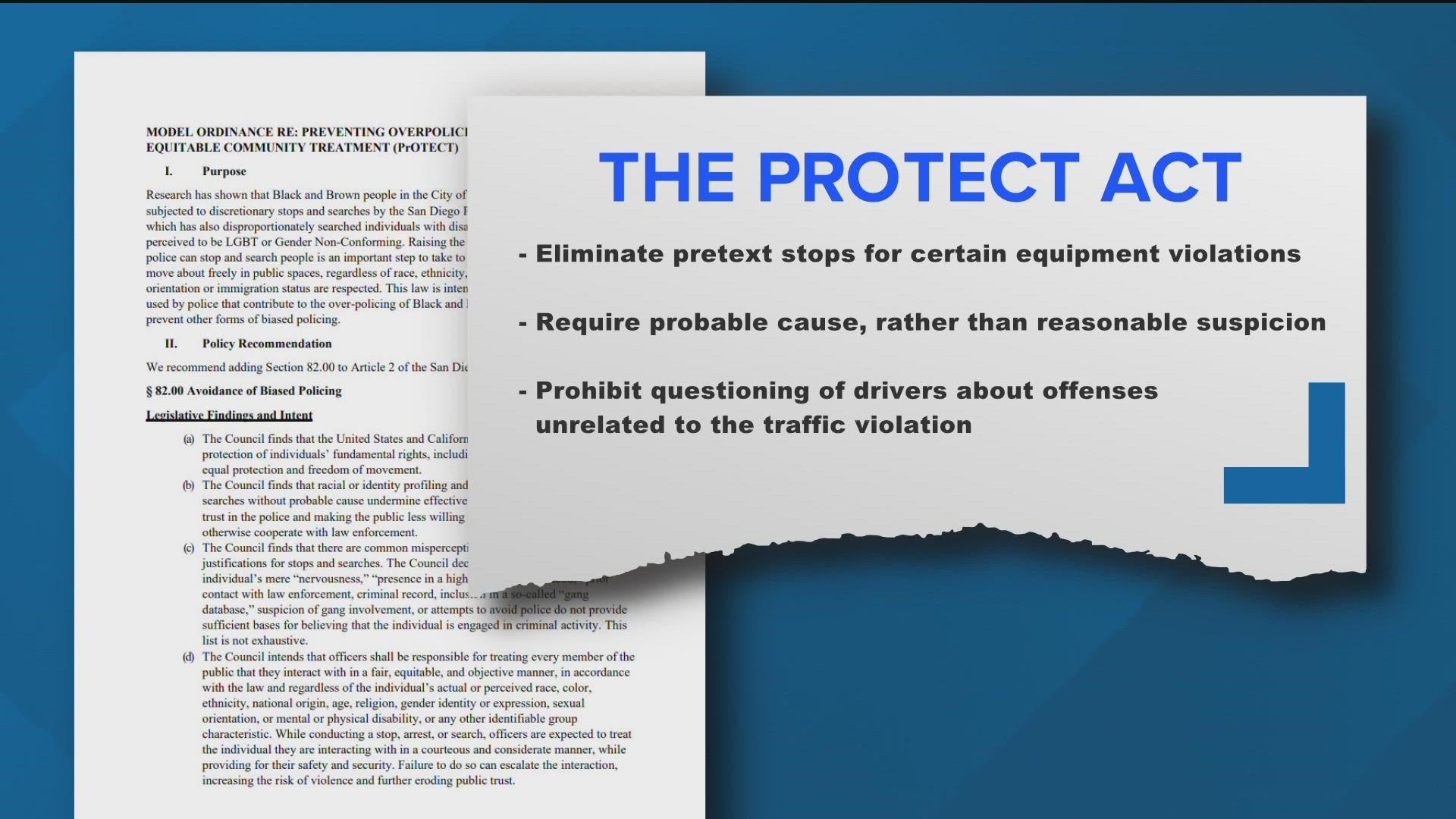SAN DIEGO — Several cities around the nation are passing new laws aimed at reducing racial profiling by police officers.
In San Diego, the proposed ordinance is called The Protect Act. If passed, the law would dramatically change the way San Diego police officers conduct traffic stops.
The Protect Act aims to restrict so-called pretextual traffic stops by SDPD.
The pretext in these types of stops frequently involves a minor traffic violation. The stops then progress to police interrogation of the driver and, inevitably, a search of the vehicle, whether consensual or otherwise.
Across the United States, studies have shown that pretextual stops tend to target black and brown drivers.
Social justice leaders point to three - separate - studies in San Diego, that showed SDPD officers are more likely to pull over black drivers than white drivers, and more likely to search them.
San Diego City Councilwoman Monica Montgomery Steppe represents District 4. She believes pretextual police stops can lead to racial profiling.
“The data is the data and, you know, I believe it,” Montgomery Steppe told CBS 8.
“The way that stops are being done now, officers do have a lot of discretion. And, that brings bias into the conversation, right?” she said.
The Protect Act was proposed by San Diego's Coalition for Police Accountability and Transparency.
It would ban pretextual stops for certain equipment violations, including “expired registration; failure to have a light illuminating a license plate; defective and unsafe equipment; absence of functional taillights, headlights, turn signals, brake lights or a high mount stop light; absence of an exhaust system that prevents excessive or unusual levels of noise; having sun shading materials and/or tinting films; or having objects suspended in the vehicle,” according to the ordinance, as currently written.
Instead of being stopped, drivers with equipment violations would receive “fix-it” notices in the mail.
The ordinance, as written, also would require probable cause rather than reasonable suspicion to stop a person.
Additionally, it would prohibit officers from questioning drivers about offenses unrelated to the traffic violation, “unless there is probable cause that the person stopped has committed, is committing, or is about to commit a crime other than the offense for which such person was stopped.”
Montgomery Steppe said The Protect Act is a work in progress, and its language is still being reviewed by an outside law firm, hired by the city of San Diego.
“The disparities are clear. We are looking to reduce and eliminate those. Whatever ordinance that we have to pass that will provide that balance, that will keep our community safe, and deal with these disparities, that's what we're going to do,” she said.
To say SDPD is opposed to The Protect Act would be an understatement.
“This is the most dangerous, this is the most extreme answer to disparate impacts on policing anywhere in the United States,” said SDPD Captain Jeff Jordon earlier this month, during a presentation to the La Jolla Town Council.
Jordon said pretext stops make communities safer, because officers find guns, illegal drugs, and arrest drivers with warrants.
“Oftentimes little stops lead to big stops. And I will tell you right now, the little stops that you're talking about, motor vehicle stops -- in the 27 months we studied those stops -- led to recovery of 2,400 guns that would still be on the street if that ordinance passed,” he said.
The Los Angeles Police Department recently updated its policies on pretextual stops by requiring officers to activate their body camera and articulate the reason why the vehicle is being pulled over.
San Diego's proposed ordinance would go further, making it a misdemeanor for an officer to violate The Protect Act.
“There is no compromise with this. None. Absolutely none. Every single one of these things [in the proposed ordinance] is a nonstarter for the San Diego Police Department,” Jordon said.
With elections coming up in November, it still remains unclear if or when The Protect Act might come before the city council for a vote.
WATCH RELATED: 'They were outnumbered' | SDPD struggles with staffing leaving 9-1-1 calls unanswered (April 2022)

